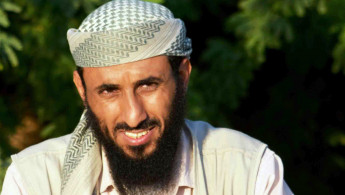Al-Qaeda number two 'killed' in US Yemen drone strike
Al-Qaeda on Tuesday confirmed that Nasir al-Wahishi, its No. 2 figure and leader of its powerful Yemeni affiliate, was killed in a US strike.
In a video statement released by the media wing of Al-Qaeda in the Arabian Peninsula, as the Yemeni affiliate is known, a senior operative read a statement announcing the death of al-Wahishi, who once served as Osama bin Laden's personal secretary, and said his deputy, Qassim al-Raimi, has been tapped to replace him.
"Our Muslim nation, a hero of your heroes and a master of your masters left to God, steadfast," senior operative Khaled Batrafi said in the video, vowing that the group's war on America would continue.
"Let the enemies know that the battle is not with an individual... the battle led by crusaders and their agents is colliding with a billion-member nation."
Yemeni security officials had earlier said a US drone strike killed three suspected militants in the al-Qaeda-held southern port city of Mukalla last week. US officials had said they were trying to verify whether al-Wahishi had been killed.
Al-Qaeda's Yemen affiliate has long been seen as its most lethal, and has been linked to a number of foiled or botched attacks on the US. In addition to leading the Yemeni affiliate, al-Wahishi also served as deputy to Ayman al-Zawahri, al-Qaeda's top leader, who succeeded bin Laden in 2011.
The death of al-Wahishi is the latest in a series of targeted killings of the Yemen affiliate's top leaders, including its most senior military leader Nasr al-Ansi, religious ideologue Ibrahim al-Rubish and others in recent weeks.
Al- Wahishi was among 23 al-Qaeda militants who broke out of a detention facility in Yemen's capital, Sanaa, in February 2006. In 2009, al-Wahishi announced the creation of AQAP, which gathered together Yemeni and Saudi militants.
Al-Wahishi's death is a major setback for AQAP, but the group's master bomb-maker, Ibrahim Hassan al-Asiri, is believed to still be alive. He is thought to have designed bombs that were slipped past security and placed on three separate American-bound airplanes, although none of them exploded.
The group has also been able to expand its reach in recent months as Yemen has slid into chaos. Rebels known as Houthis captured Sanaa last year and are battling southern separatists, Islamic militants and local and tribal militias across the country.
Yemen's military, once a close US ally against al-Qaeda, has split between opponents and supporters of the rebels, and a Saudi-led coalition has been bombing the Houthis and their allies since March.
Earlier this year, AQAP took advantage of the chaos to seize Mukalla.
Al-Raimi, the new leader of AQAP, is thought to be the brains behind a series of attacks, including a foiled plot to mail bombs to the United States and multiple attacks against Yemen's US-backed government. In writings and videos, he has vowed to topple the Sanaa government and strike America.
In a May 2011 eulogy for bin Laden, al-Wahishi had warned Americans "the matter will not be over" with the death of al-Qaeda's founder and that "what is coming is greater and worse."






![Israeli forces ordered bombed Gaza's Jabalia, ordering residents to leave [Getty]](/sites/default/files/styles/image_330x185/public/2176418030.jpeg?h=a5f2f23a&itok=_YGZaP1z)
